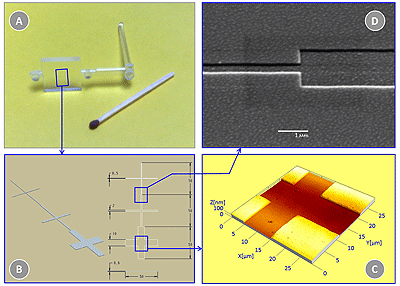Background
Lab-on-chip (LoC) technologies are based on the miniaturization of numerous known methods and applications within biotechnology, life sciences and chemistry, enabling new diagnostics, screening and treatment methods. Polymer based microfluidic devices are preferred over silicon or glass based devices due to their promising properties, such as high chemical resistance, low water absorption, good optical transparency in the near UV range and the possibility of being fabricated through replication technology enabling high-volume low-cost production. The challenge of fabricating and replicating these geometries with critical dimensions ranging from few microns down to sub-100 nanometres with high production rate is delaying the development of nanotechnology based products. Moreover, as a consequence of the key role of metrology in ultra-precision manufacturing, resolution and accuracy of current instruments are being stretched to their limit by the current needs of research and development.
Objective
The overall objective of the current PhD project is to develop methods and approaches to process chain validation for the fabrication of LoCs aimed at high volume mass production. In the PolyNano project emphasis is given to nanoimprint lithography and micro injection moulding (see Figure 1A), and therefore the process chains are defined around these two processes. The replication fidelity will be established developing harmonized and unambiguous description of the recommended measurements and methods based on geometrical metrology for micro/nano structures relevant for the applications within PolyNano (see Figure 1B). This project will focus on calibration and establishment of traceability as an integrated part of the proposed solutions. The process validation will also pass through the identification of relevant process parameters governing the manufacturing processes. The understanding of the coupling between process parameters and the resulting product quality (for example in terms of replication fidelity or replication ratio) is key issue in validating process performance (see Figure 1C and 1D). The activity will be based on experimental as well as theoretical investigations. Theoretical investigations will be based on numerical modelling of selected processes and a comparison with experimental results. Finally, based on the above mentioned results, design rules and optimization for 1-2 specific industrial cases will be developed.
Matteo Calaon, PhD student, DTU Mechanical Engineering
Hans N. Hansen, Professor, main supervisor, DTU Mechanical Engineering
Guido Tosello, Associate professor, co-supervisor, DTU Mechanical Engineering
Jørgen Garnaes, Senior scientist, co-supervisor, Danish Fundamental Metrology

Figure 1 Micro injection moulded component (A) containing a micro/nano channels design (B). The replication of the micro/nano moulded features is evaluated by atomic force microscopy (AFM) (C) and scanning electron microscopy (SEM) (D). Material: Cyclic Olefin Copolymer (COC) TOPASâ 6015.